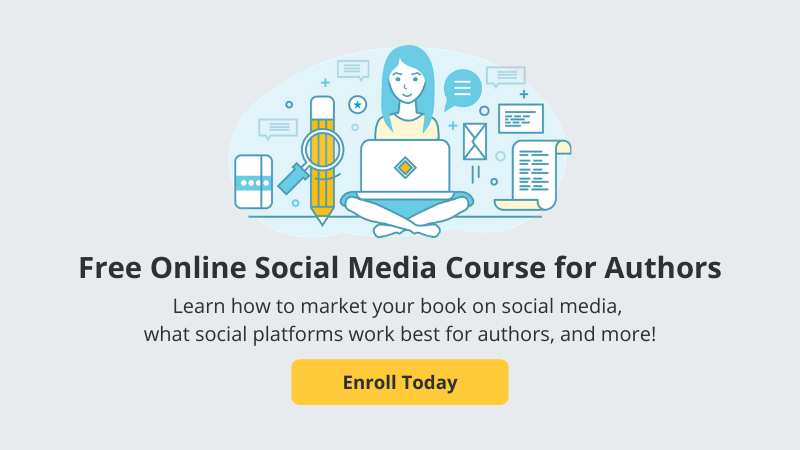Social media writer's block. It's a thing! You have no problem hammering away at an 80,000-word novel, but when it comes to a 280 character tweet? Forget about it! You end up posting about what you had for dinner or what you did during the day, and nobody seems to be listening... or following. If that sounds like you, then these 13 social media marketing tips are just what you need.
Before digging in, let’s answer the elephant in the room:
Why do authors need to be on social media?
Think about it like this: You have this great idea for a new surfboard company; you've taken out a loan, and you pour your heart and soul into this company. And then you open your store... in Kansas City. Unless you're a mail-order business, you probably aren't going to sell a lot of surfboards. It's not that your surfboards are bad. The more realistic reason you aren't selling any is that you have your audience all wrong. Social media helps you target and find your audience.
If social media content doesn't come naturally to you, you aren't alone. As a writer, you spend the majority of your working time away from other people. When you finish your book, it can be difficult to switch into social mode.
The first thing you should think about is this: you probably didn't just finish your book without setting author goals. You should apply this principle of having goals for your social media marketing as well.
You wrote a great book! Now use the 13 tips below in your social media marketing strategy to start finding readers for it! Don't let the number scare you—these are quick goals and require a daily time investment of no more than 10 to 20 minutes.
Let's get started!
1. Ask Yourself: Who Are You Writing For?
Is your goal as a writer to sell 1,000,000 copies?
Great! Lots of writers have done that. But no writer who has sold 1,000,000 copies just steps out the door and says, "my audience is everyone." They know who their book was written for, and they go after those people in their book marketing.
Before you think too hard about what you'll say, consider who you'll say it to. You don't start any social network with followers, after all. So, where do you find your target audience?
Start by following people you actually want to follow. Don't follow 5,000 people just so they'll maybe follow you back.
Follow people you genuinely want to interact with—and people who would actually interact with you.
Once you're following them, show you have an interest in what they're saying by responding to their tweets and engaging in conversations. Never forget, social media marketing is a two-way street. When you understand who you're writing for, your social media presence will start to grow organically.
There are several free and paid tools to help you. The most obvious places to start are social networks—namely Facebook and Twitter.
2. Find a Consistent Voice
You're a writer, so you probably know all about your writing voice. That voice should carry over to social media as well. Don't post uninspired tweets—show that you really enjoy doing this, and you aren't doing it because someone is twisting your arm.
Knowing who your audience is and what they're saying about you does another important thing for your book marketing: it helps you find the right message to communicate.
Maybe you've sold a few hundred books already, but you have zero interaction when it comes to your social accounts.  You speak to your readers, but no one seems to care. When you know who your audience is, you can begin making a message that's directed to them, and that they actually respond to. You should always be yourself—but be yourself in a way your readers can connect to.
You speak to your readers, but no one seems to care. When you know who your audience is, you can begin making a message that's directed to them, and that they actually respond to. You should always be yourself—but be yourself in a way your readers can connect to.
If you notice that all your readers who follow you are 20-somethings, then maybe it's time to stop live-tweeting every time Murder She Wrote comes on TV; if they're mostly on the East Coast, then they probably won't understand all of your In-N-Out Burger references; if you get negative sentiments from a tweet you posted about not wanting to have a baby, then you can probably assume that many of your readers are parents and you should lay off the topic.
3. Create a Social Calendar
Your social media shouldn't be random—"I'll post when I feel like it or when something pops in my head." It should be strategic. There will be times when you'll add something in the moment, and there's nothing wrong with that. At the very least, you should be scheduling one social media post a day on Twitter, and two posts a week on Instagram and Facebook.
When you're creating a schedule, it helps to be thematic. Mondays are for tweeting quotes, Tuesdays are for posting reviews, etc. Knowing the type of post you will publish on any given day will help you avoid having social media writer's block.
4. Be Topical
Scheduling your posts will help you manage your social media and ensure you're keeping up with your goals; but at least once a week, prove you're human by posting something topical. It could be as simple as a photo on Instagram of something you're doing, or a question to spark conversation.
5. Make Recommendations
Your readers should start seeing you as an authority figure in your genre, and you should start seeing yourself as one too. Once a week, start recommending things that your readers would enjoy. Think outside the box by not just recommending books! Recommend movies, websites, conferences—anything your audience would be into.
6. Create Shareable Content
One of the ways more people will discover you is by having others share your content. At least once a week, you should have a post or tweet that is unique and shareable. Recommendations are one place to start, but there are plenty of others—a controversial or funny statement that speaks to people, a photo that tells a story, an infographic, etc.
7. Be Social
It’s easy to forget the most important word in social media: social! Talk to people. Every day you should spend at least 5 to 10 minutes reading and commenting on social media. Be personal and genuine.
Take IngramSpark's FREE Social Media Marketing Online Course
8. Share Others' Content
The great thing about your daily social media goals is you don't have to be 100% original—and you shouldn't be! You should spend a few minutes each day retweeting or sharing things you find interesting, and think your readers would enjoy it. For example, if you write mysteries, then maybe it's a funny quote from a mystery author or a fascinating article about an unsolved mystery.
9. Who's Talking About You?
When it comes to social media marketing, you never want to miss a moment of people talking about you—but you also don't want to hover around your computer all day long just waiting for someone to say your name(you do have that next book to write, after all!). Mention is a paid tool (with a free trial) that alerts you when you have mentions and tracks the overall sentiment.
10. Post Different Content on Different Platforms
There are a lot of ways to be lazy with your social media marketing. One way: posting the same content on Twitter and Facebook.
Is that so bad? In a word: Yes!
Your message on each network should change—people who regularly use Twitter are a different audience from people who use Facebook, so your message needs to be altered. Make sure you understand the social media channel before posting.
People tend to spend less time on Twitter than Facebook, but that doesn’t mean Facebook is more important. Twitter tends to be about what’s going on in the day—it’s very casual. You may talk about what you’re writing or getting ready for. Your fans tend to see you in a much more personal and intimate way.

11. Hashtag It!
Hashtags are one of the easiest ways to get followers quickly if you use them right. A hashtag is something that starts with a # sign. When a person clicks on the word after it, they see other people talking about that topic. So, for example, if you are talking about politics, you might end your tweet with #politics.
Here are a few things to remember about hashtags:
- Don't hashtag everything. Use them when they seem relevant, but every post doesn't need nor should have a hashtag.
- Don't be generic; posting a tweet about how happy you are about something with #excited will not find you any followers.
- Use hashtags relevant to your followers—if you're at a writers' conference, for example, and there's a hashtag for that conference, use it. This will connect you with other people at that same conference.
- Think of hashtags that build into your author brand—unique hashtags that only you use. You might have a hashtag for the book you are working on, and whenever a reader clicks on it, they can see all the tweets about that particular book. Or, you may ask readers and influencers to use a certain hashtag whenever they talk about your book.
12. Use Facebook Analytics to Understand Your Followers
Any author who opens a fan page has access to detailed analytics that show them who is a fan of their page; to access it:
- Go to your Facebook page
- Click "Insights" on the top white bar; from here you'll see an overview of your reach
- On the side panel, you'll see several different options
- Select "People"
This will tell you where your fans live, how old they are, and if they're male or female. Amongst other things, these kinds of statistics can help you as you think about where you should do readings and what publications you should target for reviews. If you have a lot of readers in Alabama, for example, then you'll want to pitch your book for reviews and interviews to regional publications in that area.
13. Use Twitter Analytics to Understand Your Followers
Twitter also has analytics you should check out. There are a number of free and paid websites that can help you see who your fans are beyond what Twitter offers. One popular tool with a free option is Tweepsmap. Much like Facebook, this will show you where your followers live, but not their gender or age.
If no one is buying your book—or if you just want to sell more copies—then pause for a moment and ask yourself if you really know who your audience is.
You don’t grow your social network overnight; you don’t grow it over a few weeks. It’s a long process. It’s something you should be working on as you write your book—not as you prepare to release it. Be persistent, and don’t give up when it’s not growing as fast as you want it to.
Social media can be an intimidating task at first, but once you implement goals and get started, it will be a breeze.















